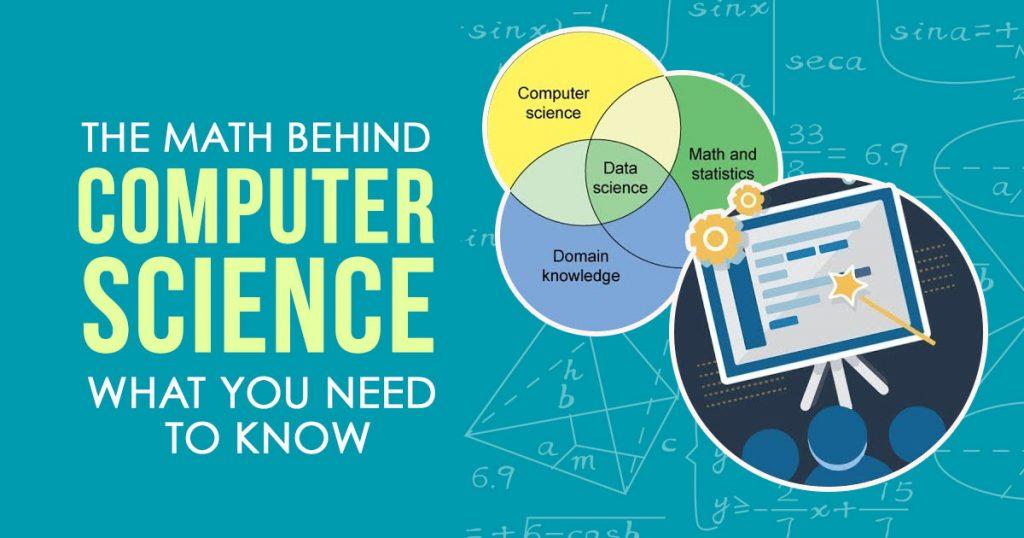Computer science relies heavily on mathematical principles. As a result, pursuing a bachelor’s degree in computer science will usually involve completing many math courses. The specific courses and their quantity will vary depending on your particular program. Understand the involvement of math in computer science, the specific math requirements, and what math is needed for computer science.
The Basics of Computer Science
Computer science is mainly about using computers to solve problems. It involves working with algorithms, data structures, and programming languages, which often use math. Even though not every part of computer science needs advanced math, knowing basic math concepts can be very helpful.
Does computer science require math?
Yes, computer science does require math, but the extent and type of math can vary significantly depending on your specialization. While you may only need advanced math for some computer science roles, having a foundation in math is essential for understanding key concepts and solving problems effectively.
How much math is needed in computer science?
If you’re considering whether there is a lot of math in computer science, the amount of math in computer science depends mainly on the specific area you pursue. For instance:
- Algorithms and Data Structures: Understanding algorithms and data structures typically involve discrete mathematics, which includes topics like logic, set theory, and combinatorics. These mathematical principles are crucial for developing efficient algorithms and managing data structures.
- Computer Graphics and Game Development: If you’re interested in computer graphics or game development, you’ll encounter topics like linear algebra and geometry. These areas of math are essential for rendering images and creating animations.
- Cryptography and Security: Cryptography relies heavily on number theory and abstract algebra. These mathematical fields are used to design secure encryption methods and protect data.
- Machine Learning and Artificial Intelligence: These fields require a solid grasp of statistics and probability. These concepts are vital for data analysis, prediction, and training models.
What are the math requirements for a computer science degree?
You’ll likely encounter various math requirements when pursuing a computer science degree. These can vary by university and program but generally include the following:
- Calculus: Many computer science programs require at least one or two semesters of calculus. Calculus is essential for understanding changes and modeling phenomena, which is relevant for fields such as computer graphics and optimization problems.
- Discrete Mathematics: This is a core component of many computer science curricula. Discrete math covers logic, set theory, graph theory, and combinatorics, which are fundamental for algorithm design and data structure management.
- Boolean Algebra: It is a type of algebra in which the variables can only have two values: true or false, represented by 1 and 0. This is different from elementary algebra, where variables represent numbers.
- Linear Algebra: Required for areas like computer graphics and machine learning, linear algebra involves vectors, matrices, and linear transformations, which are crucial for manipulating and transforming data.
- Probability and Statistics: Essential for data science, machine learning, and any field involving data analysis, probability, and statistics help interpret data and make informed decisions.
The math requirements for a computer science degree can differ greatly between schools. Some universities might have stricter math requirements, while others might include fewer math courses and focus more on practical skills. So, it’s essential to check the details of each program to see what they require.
Should you pursue computer science if you need to improve at math?
Yes, computer science can still be a good fit, even if you need to improve in math. While math is an integral part of computer science, many areas focus more on programming, problem-solving, and other skills.
Here’s how you can succeed in computer science even if math isn’t your strong suit:
- Focus on Programming: Many aspects of computer science involve writing and understanding code, which relies more on logical thinking and problem-solving than advanced math.
- Leverage Your Strengths: If you excel in areas like project management, software design, or user experience, you can contribute to computer science projects in ways that don’t require heavy math skills.
- Seek Support: Many resources, including tutoring and online courses, can help you improve your math skills as needed.
- Specialize: Some areas of computer science, such as web development or system administration, may require less math than fields like machine learning or cryptography.
If you have a passion for technology and problem-solving, there are plenty of paths within computer science where strong math skills are not a prerequisite.
Practical Tips for Managing Math in Computer Science
If you’re concerned about the math requirements for computer science, here are some practical tips:
- Start with the Basics: Ensure a solid understanding of basic arithmetic and algebra. These skills are the foundation for more advanced math concepts.
- Utilize Resources: Take advantage of textbooks, online courses, and tutoring to help with challenging topics. Many resources are available to assist with math difficulties.
- Practice Regularly: Regular practice helps reinforce understanding and build confidence in mathematical concepts.
- Apply Math to Real-World Problems: Connecting math to real-world applications in computer science can make it more engaging and relevant.
- Seek Help When Needed: Don’t hesitate to ask for help from professors, tutors, or peers if you’re struggling with math.
Computer science requires math
Computer science involves math, but how much math you need depends on your chosen area. While some parts of computer science require advanced math, others focus more on coding and problem-solving. Basic math skills are helpful, but there are many areas in computer science where you don’t need to be a math expert. If math is challenging, there are plenty of resources to help you improve. With interest and determination, you can succeed in computer science, even if you need to improve your math skills.
